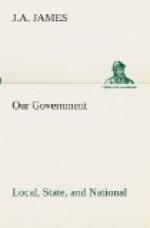Volunteers of 1898.—We should note here the manner in which men were secured for the war against Spain. We see, according to Clause 15, that the militia may be called out only for the purposes of executing the laws of the Union, suppressing insurrections, and repelling invasions. Now, in the case given, the war was to be conducted in foreign territory, and President McKinley called for 200,000 volunteers. It was understood, however, that preference would be given to those volunteers who were already members of the organized militia.
V. LOCATION OF THE CAPITAL.
Section 8, Clause 17. Congress shall have the power to exercise exclusive legislation in all cases whatsoever over such district (not exceeding ten miles square) as may, by cession of particular States and the acceptance of Congress, become the seat of the government of the United States, and to exercise like authority over all places purchased by the consent of the legislature of the State in which the same shall be, for the erection of forts, magazines, arsenals, dock-yards and other needful buildings.
One of the most interesting contests in American history arose in the selection of a site for the capital city. Congress finally accepted, for this purpose, one hundred square miles of land on the Potomac River, which was ceded by Maryland and Virginia. The thirty square miles given by Virginia were afterward returned to that State. The capital was to be in New York until 1790, then in Philadelphia until 1800. In 1800 it was transferred to the new district, called the District of Columbia.[34]
[Footnote 34: For the government of this district, see “Government in State and Nation,” p. 204.]
VI. IMPLIED POWERS.
Strict and Loose Construction.—Our national development has been, in large measure, dependent on the interpretation of the next clause of the Constitution. It is often called the elastic clause.
Section 8, Clause 18. To make all laws which shall be necessary and proper for carrying into execution the foregoing powers and all other powers vested by this Constitution in the government of the United States or in any department or officer thereof.
Briefly stated, the problem has always been, Has Congress the right to exercise powers not definitely granted by the Constitution? Alexander Hamilton first set forth the doctrine of implied powers. He urged that Congress might, in carrying out specific powers, use methods not expressly provided for in the Constitution, as in the creation of a bank or mint. Since the time of this interpretation, which, fortunately for American interests, was sanctioned by Washington and later by the Supreme Court through its great Chief-Justice John Marshall, the advocates of the doctrines of strict and loose construction have contended for their principles. Does the Constitution




